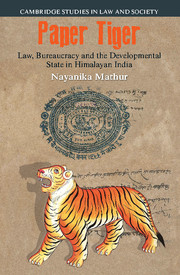1 - A Remote Town
Published online by Cambridge University Press: 05 October 2015
Summary
Space is space, life is life, everywhere the same.
—J. M. Coetzee, Waiting for the BarbariansProvincialism, or provinciality, is a space recognizable instantly.
—Nita Kumar,Provincialism in Modern IndiaThe town of Gopeshwar, the administrative headquarter of the Himalayan borderland district of Chamoli, is the quintessential ‘out-of-the-way place’ so prized by past anthropologists for the ease with which it could be presented as ‘pristine’ (Tsing, 1994, p. 282). The town and, more generally, the district was nearly always described to me through the utilization of the English word ‘remote’. Gopeshwar is to be found at a distance of 280 km from Dehradun and 235 km from the nearest railhead, Rishikesh. Given its distance from large urban centers, its location on India's border with Tibet, its difficult terrain, and its poor transportation infrastructure, I did not, initially, find the frequent application of ‘remote’ to Chamoli altogether surprising. However, with time I began to question and further explore this overwhelming discourse of ‘remoteness’. Local accounts narrated present-day Chamoli as a place that has, since time immemorial, existed distant from the centre; a distance that remains to be overcome. The trope of remoteness is ubiquitous in all discussions of this upper Himalayan region. It is present in British colonial accounts and in local self-descriptions; in the statehood movement that raged during the 1990s, as well as in present-day quotidian chatter amongst a cross-section of town residents.
The questions I ask in this chapter are how, and why, does a place come to be overwhelmingly defined by its so-called remoteness? What does it feel like to live in a ‘remote’ Himalayan town? What, indeed, does the attachment of the adjective ‘remote’ do to a place? Instead of taking the word ‘remote’ to signify a harmless, geographical fact, I draw upon the now exhaustive work on space, place, and territory that highlights the cultural and political work involved in rendering spaces with a seemingly natural and self-evident geography (e.g. Moore, 2005; Massey, 1994), to argue that this uncritical characterization of Gopeshwar as a ‘remote town’ contributes to the perpetuation of spatial inequity within India (Ludden, 2012). Beyond the pragmatics of living in and governing a remote place, I describe the experiential aspects of remoteness. Taking these strands together, I make a case for taking the particularities of space seriously in analyses of the workings of law, development, and the state.
- Type
- Chapter
- Information
- Paper TigerLaw, Bureaucracy and the Developmental State in Himalayan India, pp. 36 - 58Publisher: Cambridge University PressPrint publication year: 2015



